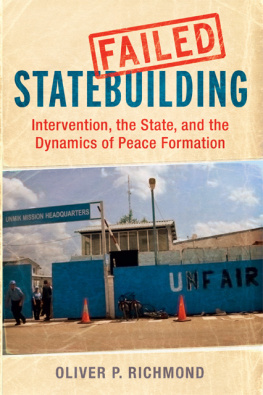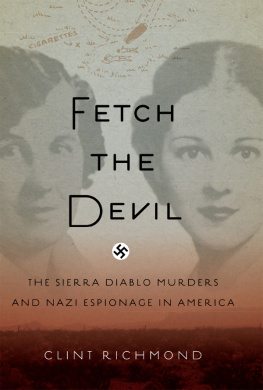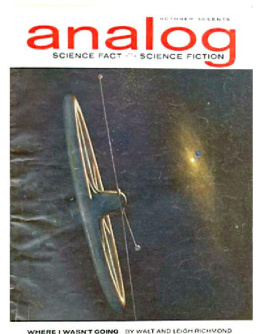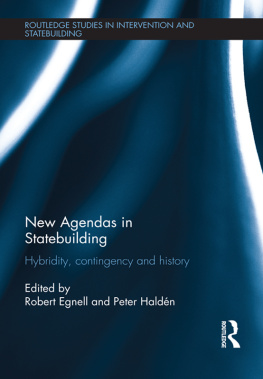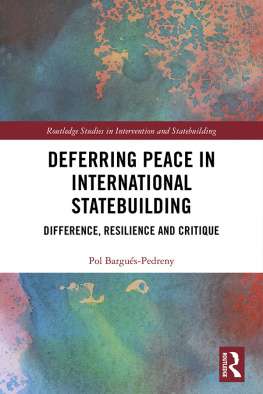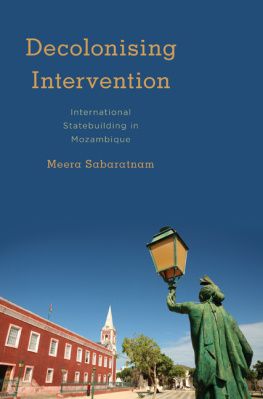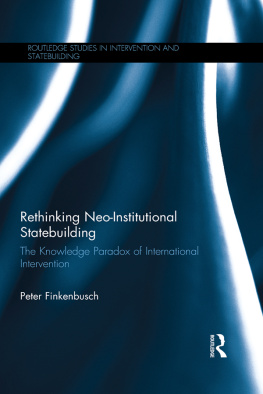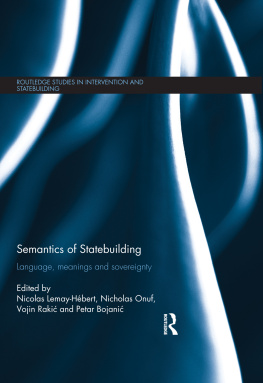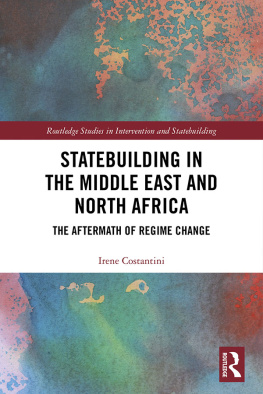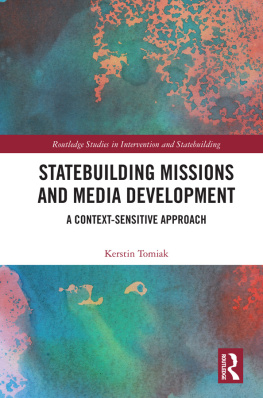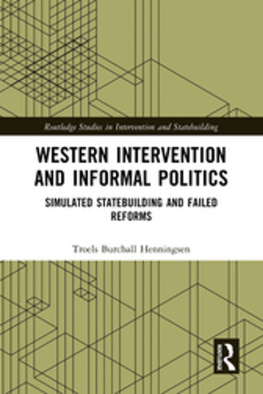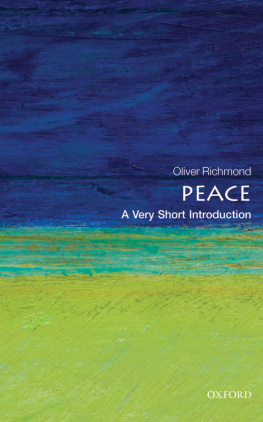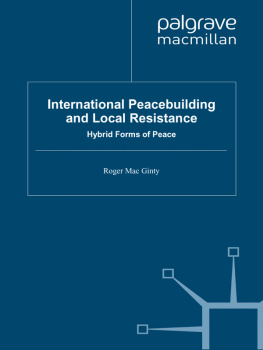

Copyright 2014 Oliver P. Richmond
All rights reserved. This book may not be reproduced in whole or in part, in any form (beyond that copying permitted by Sections 107 and 108 of the U.S. Copyright Law and except by reviewers for the public press) without written permission from the publishers.
For information about this and other Yale University Press publications, please contact:
U.S. Office:
Europe Office:
Typeset in Adobe Caslon Pro by IDSUK (DataConnection) Ltd
Printed in Great Britain by TJ International Ltd, Padstow, Cornwall
Library of Congress Cataloging-in-Publication Data
Richmond, Oliver P.
Failed statebuilding : intervention, the state, and the dynamics of peace formation / Oliver P. Richmond.
pages cm
Includes bibliographical references and index.
ISBN 978-0-300-17531-8 (cloth)
1. Developing countriesForeign relationsWestern countries. 2. Developing countriesPolitics and government. 3. Nation-buildingDeveloping countries. 4. Peace-buildingDeveloping countries. 5. Intervention (International law) 6. Nation-buildingPhilosophy. 7. Peace-buildingPhilosophy. 8. World politics1989- 9. Western countriesRelationsDeveloping countries. I. Title. II. Title:Failed state-building.
D888.W47R42 2014
327.1'17dc23
2014022295
A catalogue record for this book is available from the British Library.
10 9 8 7 6 5 4 3 2 1
Contents
Acknowledgements
I HAVE BEEN WORKING on the problem of failed statebuilding as a product of international assemblages of intervention, and on its counterdynamics of peace formation, since 2009, when I finished my previous book (co-written with Jason Franks), Liberal Peace Transitions. This analysis is underpinned by the concept of peace-as-governance as a culmination of three generations of peacemaking praxis, which I introduced in my book Maintaining Order, Making Peace in 2000. This, combined with the critique of liberal peace, as discussed in my later study The Transformation of Peace (2005), and the realisation of the requirement for empathy emancipation from an everyday perspective of peace, as I explored in Peace in IR (2008), led eventually to an interest in local forms of mobilisation for peace. Everyday peace encounters and their hybrid outcomes have underlain much of my work since and during my PhD on UN mediation in Cyprus, even if I did not begin to express it in this language until much later. It is only recently that I have begun to see the larger picture in which local practices of peace formation have proven a rich counterpoint to much that has gone wrong with the UN and donor system and ultimately with some basic assumptions in International Relations (IR) itself. The analysis I present in this study is most indebted to the many people around the world in conflict-affected societies who have shared their thoughts on the potential in, and obstacles to, the work over the last two decades or so. Without those discussions it would have been very hard to move beyond mainstream peacebuilding and statebuilding theory. I would also like to thank my editor at Yale, Phoebe Clapham, for encouraging me to write this book; likewise, numerous colleagues for their support, constructive advice and warnings, at the University of St Andrews and HCRI, University of Manchester, where I was based while this book was being written, especially Alison Watson, Roger Mac Ginty and Sandra Pogodda. Thanks also to colleagues and (relatively) friendly audiences at Gothenburg and Lund Universities in Sweden; York University in Toronto; Sabanci University in Istanbul; Kenyon Institute, East Jerusalem; Bradford, Durham, Kent and Warwick universities; ISA audiences in San Francisco in 2013 and Montreal in 2012; University for Peace in Costa Rica; the PACSA-PRIO conference in Nicosia, Cyprus; ECPR in Reykjavk, Iceland; Kyung Hee university, Korea; Javeriana University, Bogota, Colombia; University of Cyprus; University of Otago, New Zealand; Murdoch University, Australia; and UNDP, New York, where various versions of this approach were first presented.
Preface
I HAVE LONG BEEN interested in the nature of the contemporary form of peace, and how the major players in world politics are attempting to build this new peace. Yet it is clear to me that attempts to propagate the new peace are in part responsible for some of the structural violence we see in the world today. A new peace in the twenty--first century, as a consequence, needs to be more sensitive to context and culture, to its own unintended consequences, and particularly to how it is embedded in old patterns of exclusion, discrimination, class, greed and elitism, as well as in ideological prescriptions about states and markets. Peacebuilding and statebuilding in todays world resemble the colonial projects of previous eras when looked at from the perspective of their recipients in far-flung corners of Liberia, Guatemala, Timor-Leste, Afghanistan or Bosnia, for example. The liberal peace and statebuilding derived from them have similar contradictions and tensions within them, as Keynes saw in the Treaty of Versailles.
Many would imagine that war and post--conflict zones are devoid of any component of peace, or any aspect of normal life. They are not. Everyday life continues for most. But it is disrupted, moulded and shaped by the tensions of personal, political and group interests channelled into ethnonationalism, tribalism, religious or ideological extremism, terrorism and fear. Poverty and insecurity are the result for most ordinary people, though elites often continue relatively untouched. I have seen such dynamics from a wary proximity over a long period of research spent on peace processes, peacebuilding and conflict. While I was initially relatively apolitical and disconnected from the world out there thanks to the predominantly positivist methodology the Western Academy dictates, these experiences helped me understand everyday life in such places better, and become more self--critical and aware of how embedded the developed world is in those conflicts. So this reflection is part an expos of hypocrisy, an uncovering of the inflexibility of peace processes revolving around state power and sovereignty, and part a celebration of the braveness and resilience in everyday life shown by children, women, and men hundreds of millions of them around the world who live under the pressure of intractable conflicts. It is an investigation of the processes of peace formation they bring into being, often with external help, but also often by themselves.
Since the Cold War ended, many have waited for policymakers, politicians, bureaucrats, economists, development specialists, military and academics to consolidate peace through peacebuilding and statebuilding, to tame the violent internal and regional dynamics of state formation. The last twenty years have shown they cannot do this without grounded and embedded legitimacy, which connects to the everyday lives of the citizens of the states they are attempting to create. International law, Security Council resolutions and donor development policies are not contextual or legitimate enough. International institutions are too mired in their own routines of thought, in their own internal hierarchies and, of course, those of international sovereignty their own paradigms and in their own comfortable professional situations. They are afraid of context and the local, because they expose their ignorance and lack of capacity. They are thus caught in a trap of their own making.
Next page
